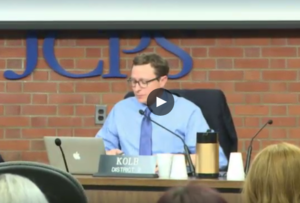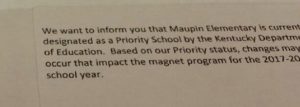Dear JCPS,
In life, when you fail to take action in a timely fashion, your decisions will be made for you. Fail to pay your mortgage or your car note? Fail to turn in paperwork? Forget to make an important decision? You know how it goes.
That’s what is happening right now in our school district. We are facing a litany of legislation and overreach from Frankfort, in many ways directly attacking JCPS. On top of that, we are being subjected to a management audit from KDE. I believe all of this is a result of inaction and indecision by our district leadership.
For example, we saw the writing on the wall with regards to inequitable and outdated student assignment plan for some time now. In September, there was even a work session around this difficult and delicate topic. But as far as I know, no action has been taken.
And then suddenly, as if out of the blue, we find ourselves potentially faced with the possibility of having to blow up our student assignment plan, leaving our most vulnerable students the ones to take the greatest hit. This led to scrambling to make maps and respond to attacks instead of bringing forth recommendations and action plans while they were still our ideas. It’s hard work, which is why we need strong leadership. Instead we tend to be reactive, not proactive.
In addition to having HB151 thrust upon us, we are about to have to potentially surrender some of our badly needed tax dollars to support so called “public” charter schools. How are we supposed to juxtapose that exposure with our billion dollar problem with our growing facilities needs?
Not only is our inaction causing us to have decisions made for us, we are not even putting up a fight. Instead of creating an effective defense against unscrupulous education reformers. We seem to be rolling out the red carpet. This must stop!
Awhile back, you supported the district’s legislative position with regards to superintendent hiring the school principal because she is the one who is held accountable. Look at the situation Shawnee is in. This is not a new problem that just came to our attention today for the first time. Where is the accountability? Who is coming to their aid?
Over the course of the past two years, we’ve watched a poorly planned implementation of School of Innovation. And as a result, on Friday, Maupin lost its SBDM. They were made promises that were left unfulfilled and students are paying the price. Who is being held accountable?
We focus on adult problems instead of kids. We deny problems exist instead of addressing them. There seems to more interest in kicking the can down the road or playing shell games than in doing the heavy lifting of doing it right the first time. We are afraid to take risks, to be bold and decisive.
For the last several months, and longer, board members have expressed frustration with how long they’ve been waiting on reports, proposals, solutions, etc. We knew we had problems that needed to be addressed, but yet more months go by where nothing seems to happen.
I share your frustration. And yet, we continue repeating same mistakes.
I hear repeated requests from board members to “do something.” Again, last board meeting, regarding the facilities plan. However, those pleas seem to be directed at the JCPS staff, instead of the person who has the authority to make action happen. The person who is supposed to be accountable to you.
Really, there is only one employee you supervise. That is who you should be looking at. That is who you should be demanding to take action. She is the one who needs to do something. And if she doesn’t.
You must.
Inaction has led us to this predicament. We cannot afford to be indecisive. We must take control. Before more is done to us.
Something must be done before the contract renewal season. While there is still time for someone to guide us through the audit and staffing for a turnaround. May 15, I believe.
We repeatedly hear and personally experience the culture of fear, intimidation and retribution in JCPS, instead of openness to constructive criticism. Under toxic and ineffective leadership, staff become paralyzed. Don’t look at the staff. Many of them are just doing what they must do to survive. To keep their jobs. They are not to blame.
This starts at the top.
Hold your direct report accountable.
I ask you please. Do something.

 Dear Senators on the Education Committee,
Dear Senators on the Education Committee,
 Dear JCPS,
Dear JCPS,